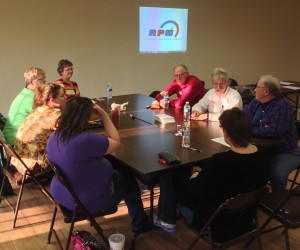
As a result of focus groups conducted by the Texas A&M Transportation Institute (TTI), researchers learned that Texans know very little about how transportation is funded. For example, although most participants knew that taxes pay for transportation, few mentioned fuel taxes, or knew that the Texas fuel tax has not been raised since 1991. They were also unaware that the state is $17 billion in debt as a result of bonds that were issued to pay for infrastructure projects.
The 11 focus groups were conducted across the state earlier this year by researchers with TTI’s Transportation Policy Research Center (PRC). The purpose of the project was to evaluate various education and outreach materials related to transportation funding and finance.
“The focus group members watched a video, reviewed a one-page document and viewed a PowerPoint presentation,” Tina Geiselbrecht, manager of TTI’s Public Engagement Program, explains. “The discussions afterward were enlightening, and participants’ input will help us develop education materials that best explain various aspects of our transportation system, including how it’s funded and how reliable freight movement is essential to our economy.”
Based on the feedback from participants, the researchers detailed numerous observations that will help in the development of transportation education materials:
- Most participants are angry that debt is relied on to pay for transportation projects and blame legislators for not addressing the problem or communicating the problem to constituents;
- Participants voiced concerns about “waste and fraud” in transportation projects and oppose debt financing or a tax on miles they drive;
- Although they admit increasing the fuel tax appears to be the easy fix — and they seemed to support it over other options, such as increasing debt financing or a tax on miles they drive —participants acknowledge that any change will be difficult.
- Focus group members want a trustworthy, third party to help educate the public about transportation issues;
- In learning about the importance of a quality transportation system, participants want to see specific examples of how transportation impacts the cost of goods, and thereby their pocketbooks;
- Participants say they would prefer videos and the use of social media, like Facebook or Twitter, to help in the transportation education process.
“Even though surveys are typically used to quantify public opinion about transportation, focus groups allow us to determine why people feel the way they do,” Geiselbrecht says. “Knowing the reasons behind their opinions certainly helps us have better insight into the various obstacles.”
As researchers conducted the focus groups, members appeared to learn a lot more about transportation dilemmas. “As the participants became more aware of the funding issues, they showed a much greater interest in addressing them,” TTI Associate Research Scientist Trey Baker says. “So, in order to solve some of our problems, it became clear that education has to be the first step.”
In addition to the development of education materials, TTI researchers were asked to share what they learned from the focus groups with other professionals at a transportation communications conference, called TransComm, in September and the AASHTO annual meeting in Charlotte, North Carolina, in December. They will also present their findings to the Transportation Research Board Annual Meeting in Washington, D.C., in January 2015.